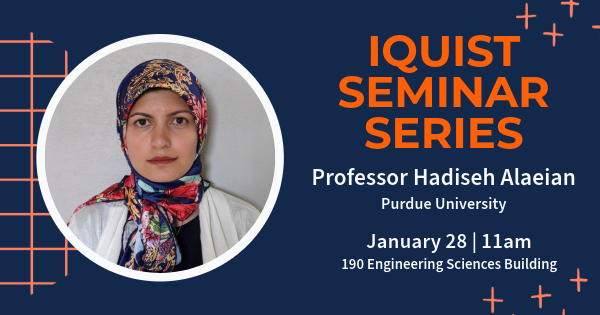IQUIST Seminar: Hadiseh Alaeian, Purdue University

- Sponsor
- IQUIST
- Speaker
- Hadiseh Alaeian, Assistant Professor, Purdue University
- Contact
- Stephanie Gilmore
- stephg1@illinois.edu
- Phone
- 217-244-9570
- Views
- 239
Rydberg Photonics with Thin-Film Cuprous Oxide
Abstract: Cuprous oxide (Cu2O) has gained attention as a solid-state material with the potential for hosting excitonic Rydberg states. These states are defined by high principal quantum numbers (n), leading to significantly larger wavefunctions. As a result, Cu2O exhibits strong dipole-dipole (∝ n⁴) and van der Waals (∝ n¹¹) interactions, making it an attractive platform for solid-state quantum technologies. Thin-film Cu2O samples are of particular interest as they can be meticulously fabricated to reduce defects, allowing for the observation of extreme single-photon nonlinearities via the Rydberg blockade.
In this presentation, I share our recent findings on the spectroscopic absorption and photoluminescence of Rydberg excitons in synthetic Cu2O thin films. Our results show a series of yellow excitons extending up to a principal quantum number of n = 7. I discuss our progress in the bottom-up assembly of 2D arrays of Rydberg excitons, which could make a platform for simulating lattice models. Furthermore, I present promising results from coupling Rydberg excitons with silicon nitride photonic circuitry, marking a significant advancement in Rydberg photonics. Finally, I will cover our theoretical results on open quantum system phase transitions that can be explored using strongly interacting Rydberg polaritons. These discoveries pave the way for the development of scalable and integrated on-chip quantum devices based on Rydberg states in Cu2O.
Bio: Hadiseh Alaeian received her Ph.D. in Electrical Engineering and Physics from Stanford University in 2015. For her dissertation focused on the studies of non-Hermitian and active photonic systems, she received the silver medal from Materials Research Society in 2015. After her graduation, she moved to Germany first, as a Humboldt postdoctoral fellow at the University of Bonn and later as a junior group leader at the 5th institute of Physics at the University of Stuttgart. Her research has been focused on quantum dynamics and phase transitions in photonic systems including their Bose-Einstein condensation and atom-induced photon-photon interactions. In August 2020, Hadiseh joined Purdue as an assistant professor of the Electrical Engineering and Physics where she is extending her studies to the strongly interacting quantum photonics and quantum photonic gates using Rydberg excitons
To watch online go to the IQUIST youtube channel: https://www.youtube.com/channel/UCCzAySwQXF8J4kRolUzg2ww